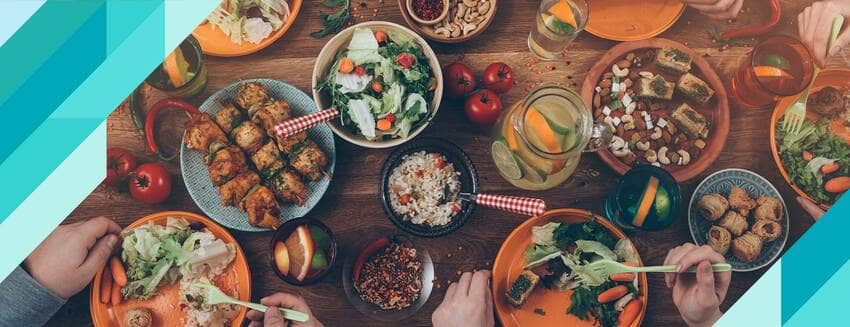
As the Ramadan feast is just days away, preparations for the feast continue at full speed. Rich tables are among the indispensables of Eid al-Fitr, which comes after Ramadan coincides with hot days and an average of 17 hours of fasting. Stating that a new diet is needed in the transition to normal daily nutrition after the changing nutritional routine during Ramadan, experts pointed out that excessive and fast-consumed foods during the feast lead to many disorders, especially the digestive and circulatory system.
[haberyatay=unbalanced-nutrition-affects-child's-success]
Üsküdar University NPISTANBUL Hospital Nutrition and Diet Specialist Özden Örkçü warned against excessive and fast eating during Eid al-Fitr.
After Ramadan, a new diet is needed
"Our body, which gets used to eating 2-3 meals after a month-long fasting, regulates the cholesterol-lipid balance, the load on the digestive and circulatory system decreases, and our body generally relaxes with the removal of excess weight," says Nutrition and Diet Specialist Özden Örkçü,
"After Ramadan, there is a need for a new dietary pattern in the transition to a normal daily diet. We should continue our habits at the end of Ramadan without losing the beauties gained during Ramadan (for example; not eating before we are hungry, balanced nutrition and hydration, quitting bad habits that we always know are harmful to our health such as alcohol and smoking)."
Excessive and fast eating leads to many ailments!
"Consuming food excessively and quickly after Ramadan will cause many disorders in our body, especially in the digestive and circulatory system," Özden Örkçü said:
"Gastritis with indigestion, bloating and nausea, or reflux disease, which is described as the burning of food that occurs after overeating, palpitations after overeating, feeling of tightness in the chest are some of them. Changes in defecation habits are also among the diseases that may occur as a result of an unbalanced diet. Patients with chronic diseases who can fast during Ramadan are advised to see their doctors at the end of the feast to be re-evaluated and their medications reorganized."
The best way to avoid holiday treats: Saying "no"
Although the trays of pastries, desserts, stuffing and wraps made for the guests during the feast are very appetizing, the best way to avoid feast treats is to be able to say 'No' to the extended treats or to share your plate with someone else and to complete your visit with the least damage."
Avoid fried foods and eat a vegetable-based diet
Özden Örkçü said, "The number of daily meals should be 5-6, but 2-3 of these should be determined as snacks."
"For main meals, more vegetables, chicken or lean meats should be preferred and prepared boiled or baked. Deep-fried foods should be avoided. Fluids should be taken frequently but in measured amounts. Instead of acidic drinks, light drinks such as buttermilk, homemade lemonade, fruit compotes should be preferred. Especially those with reflux and chronic gastritis should avoid excessively spicy, peppery and fatty foods. Fruit should be taken between meals, but the portion size should be observed."
How should you eat on Eid?
Üsküdar University NPISTANBUL Hospital Nutrition and Diet Specialist Özden Örkçü gave the following information about the recommended diet during Eid al-Fitr:
[haberyatay=correct-nutrition-habits-should-be-taught-while-children]
"Since Eid morning is the first breakfast that everyone will have together after Ramadan, it has a rich and varied menu. It will not be easy for our stomach, which has entered into a new eating habit with Ramadan, to digest this rich menu. As such, the first question that comes to mind is how should we eat on the morning of Eid and at other meals?
Drink 1 glass of warm lemon water in the morning on an empty stomach
When you wake up, taking 1 glass of warm water with lemon and 3 dried apricots on an empty stomach will reduce the complaints of bloating and constipation after Ramadan. After 30 minutes, you should definitely have breakfast.
Avoid heavy and fatty foods
For breakfast, instead of heavy and fatty foods such as pastries and fried foods; cheese, olives, jam / molasses, tomato-cucumber, boiled egg, whole wheat bread, unsweetened tea or herbal tea should be made. Lunch should be protein-heavy, and a low-calorie, easily digestible vegetable-heavy menu should be preferred in the evening. Make time for light brisk walks 45 minutes to 1 hour after meals."
What can be consumed on the 1st day of Bayram?
Üsküdar University NPISTANBUL Hospital Nutrition and Diet Specialist Özden Örkçü made the following suggestions for the 1st day of the feast:
"In the morning
1 slice of cheese
3-4 olives or 2-3 walnuts
1 teaspoon molasses or honey
1-2 slices of whole wheat bread
Cold cut tomatoes and cucumbers
(Eggs at least 3 times a week if there is no disease that may prevent it)
Search
1 serving of fruit
Noon
90 g grilled meat/fish/chicken
6 spoons of bulgur pilaf or wholemeal pasta
Plenty of salad
Search
1 serving of fruit or 1 milk dessert special for the holiday
Evening
1 bowl of soup
1 serving of vegetable dish
Salad
Half a bowl of fat-free yogurt
1-2 slices of whole wheat bread
Search
Half a bowl of yogurt or 1 cup milk (with cinnamon) or 1 cup plain kefir + 2 walnuts."

